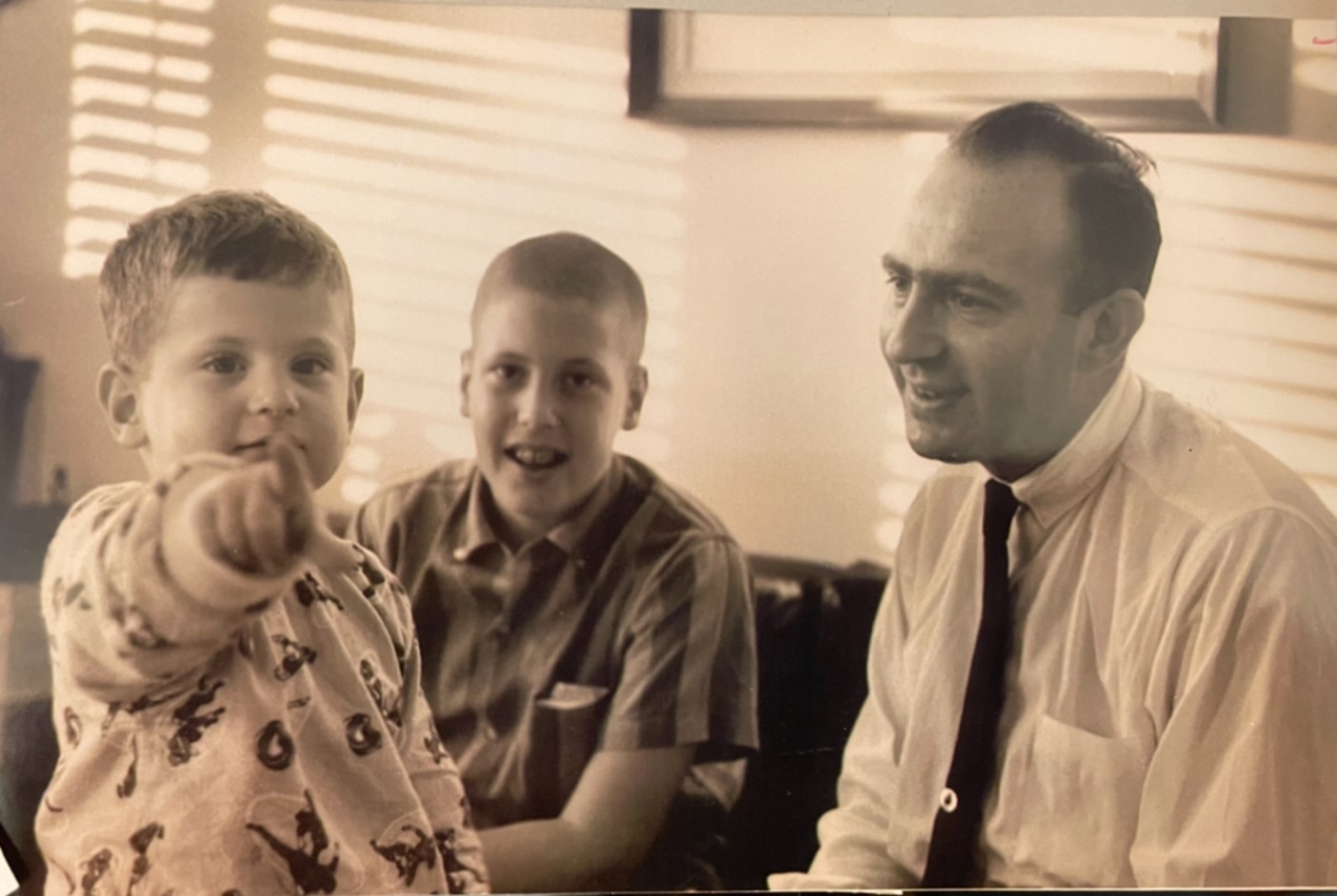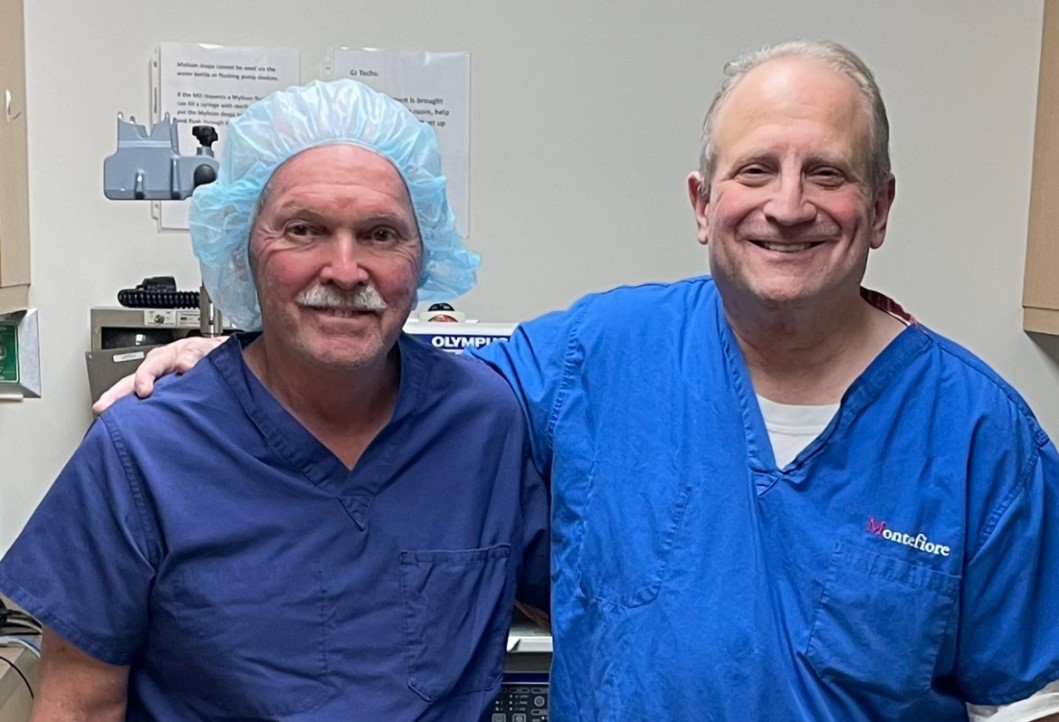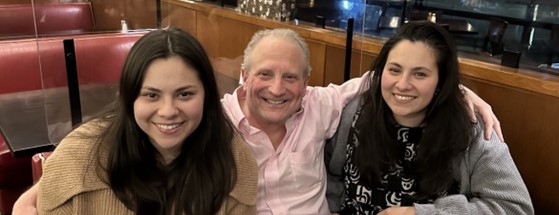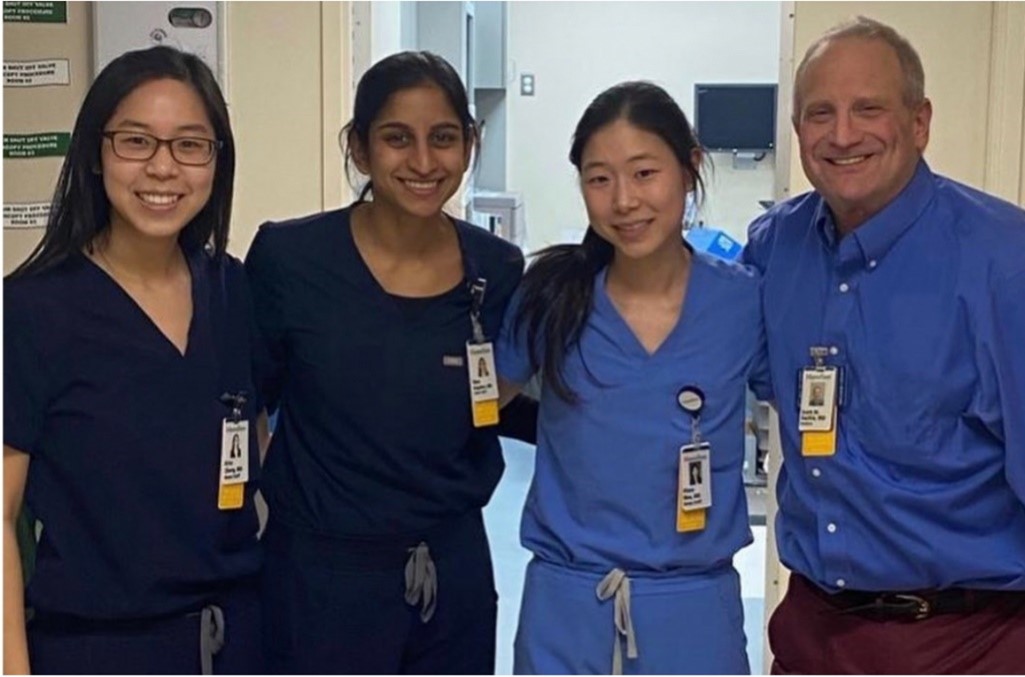 From left: Dr. Scott Suchin, his brother, Neil, and his dad, Jerry, the inspiration for the Jerry Suchin Endowed Scholarship for Nurses
From left: Dr. Scott Suchin, his brother, Neil, and his dad, Jerry, the inspiration for the Jerry Suchin Endowed Scholarship for Nurses
Dr. Scott Suchin’s career journey has seen him evolve from nurse to doctor—and now, philanthropist. After experiencing what he considers the best of both careers, he has established a scholarship for nurses to become compassionate physicians and follow in his path.
Scott Suchin, RN, MD `99
Scott Suchin, R.N., M.D. ‘99, wants to put more nursing into doctoring.
 Dr. Suchin and his favorite nurse anesthetist, Robert "Bob" Foster, CRNA, a Vietnam veteran and former U.S. Navy medic
Dr. Suchin and his favorite nurse anesthetist, Robert "Bob" Foster, CRNA, a Vietnam veteran and former U.S. Navy medic
During his 20s, Dr. Scott Suchin volunteered as a recreation therapy assistant at the FDR Veterans Administration (VA) hospital in Montrose, New York, where he saw male nurses in action. Many were police officers and firemen who had retired young and wanted a second career,” he said. These big, burly, tough guys became my role models.” Though still recovering from the untimely death of his beloved father, Dr. Suchin graduated magna cum laude from Pace University’s Lienhard School of Nursing in Pleasantville, New York, at age 28 with the help of a veterans scholarship. He added with a chuckle, "This scholarship also provided me with a $621-per-month stipend. I thought I was rich.”
The Nursing Years
While working in the medical ICU at the New York VA Medical Center during the difficult early years of AIDS, when almost all those infected died, Dr. Suchin was once again inspired—this time by the NYU residents he worked closely with. "I liked what they were doing as much as what I was doing,” he said. "Yet I felt I was too old to go to medical school.”
He set his sights on becoming a nurse practitioner, but the coursework bored him. "While I will always be an advocate for nurses,” he explained, "the nursing theory and research curriculum needed to become an NP was not to my liking.” In his early 30s, he finally decided to take the MCATs and apply to medical school. To qualify, he took about 10 pre-med courses, many of which he had already completed for nursing school. “I had to start from square one,” he said.
The Einstein Years
Dr. Suchin’s first two years at Einstein were a shock. "I had always done well academically, but at Einstein there were all these people brighter than me who could read the syllabus once and nail the tests, whereas I had to read it seven times just to pass,” he said. "Plus, my first daughter was born around then, so it was rather stressful.” Relief came during the third and fourth years with the emphasis on patient care. "I felt whole again,” he said. Dr. Suchin graduated in 1999 and completed his internship and residency at Montefiore in 2002. With help from Lawrence Brandt, MD, Chief of Gastroenterology and Professor in the Departments of Medicine and Surgery, he entered New York Medical College as a gastroenterology fellow, concurrently moonlighting as a physician assistant at Montefiore Einstein to help pay the bills.
Today, in his busy Montefiore practice in the Bronx, Dr. Suchin helps patients with the full gamut of GI issues, ranging from irritable bowel syndrome, inflammatory bowel disease, and liver and gallbladder disorders to heartburn and constipation. "If you're 45, don't forget your colonoscopy,” he said. “It really does save lives.” He's also an attending physician at Montefiore Einstein, teaching GI fellows, rounding on inpatients, and doing emergency procedures.
The Genesis of a Generous Gift
“I’ve long felt that if more nurses became physicians, healthcare as a whole would be better,” said Dr. Suchin. "Nurses bring a more holistic, hands-on approach to patients and their families.” He added, "I still do a lot of things that nurses do, like getting blankets for patients, speaking with family members, and taking a social history. These are real game changers in terms of quality care. Getting to know my patients above and beyond their GI issues is the most gratifying part of my job.”
 Dr. Suchin with his daughters, Jolie and Charli
Dr. Suchin with his daughters, Jolie and Charli
"Remuneration and productivity seem to far outweigh the importance of quality and compassionate patient care,” he explained. “I'd like to see medicine lean less toward the dollar and more toward integrity, humility, kindness, empathy, and altruism (IHKEA)—the kinds of qualities that nurses bring to the table. Many doctors also have IHKEA qualities, but we need more.”
Dr. Suchin recalled being told the following motto when he was a student at Einstein: “In the field of medicine, the person you are is as important as what you know.” After many years of caring for patients, he thinks this maxim should be revised to say, “In the field of medicine, the person you are is more important than what you know.”
Moreover, Dr. Suchin explained that "nurses already have experience caring for patients in the trenches and probably have a clearer grasp of what it takes to be a truly good physician. No doubt, they have a better understanding of what the future holds for them once they become doctors. Unlike most, they are choosing a career path they themselves have already witnessed. They know what they want and are going into medicine, I believe, for all the right reasons.”
Why don't more nurses become doctors? "Too many years, too much money,” said Dr. Suchin. "It takes four years of medical school, and then at least three—and as many as nine—more years of training. And you probably graduate from medical school carrying a huge debt.” He himself finally finished paying off his loans last year. He was now free to make the path from nurse to doctor easier for others. "I can't take away the years of training or the arduous workload, but if I can take away the economic toll, then maybe more nurses who want to become physicians can do so,” he said.
To that end, Dr. Suchin has established a targeted scholarship at Einstein for nurses who would like to make that transition. "With its focus on compassionate care, Einstein was the perfect place to do it,” he said. "And I wanted to give back to the institution that gave me this opportunity. To my knowledge, this will be the first medical school in the country to offer a full scholarship for nurses to attend medical school.”
 Dr. Suchin with his Montefiore GI fellows, from left: Erica Chung, Nina Kogekar, and Diana Wee
Dr. Suchin with his Montefiore GI fellows, from left: Erica Chung, Nina Kogekar, and Diana Wee
Circling back to his father, Dr. Suchin has this bittersweet memory to share : “Before my father died, he said to me, ‘Scott, go out and make a contribution to society.’”
To honor his memory, Dr. Suchin created the Jerry Suchin Endowed Scholarship for Nurses, which has already been awarded to a member of the Class of 2027. “I cannot think of a better way to contribute to society than by pursuing this dream, this vision of mine. I only wish he were here today to see this.”
Dr. Suchin’s gift will be matched dollar for dollar—doubling the impact of his generosity—as part of a $5 million gift from an anonymous donor to establish need-based scholarships.
To expand support for nurses who wish to attend Einstein, the endowed scholarship fund remains open to additional contributions. If you’d like to make a donation, please click here.
To establish your own legacy at Einstein, contact the Office of Alumni Relations at einsteinalumni@einsteinmed.edu.